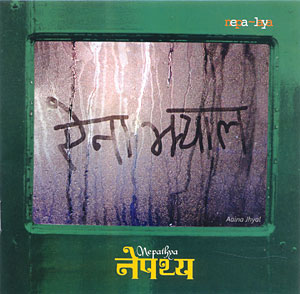 |
The music is rock, but the rhythm of its madal heartbeat, the melody of its flute interludes and the earthy jhayure lyrics give Amrit Gurung's new album a distinctive Nepali sound.
This is folk-rock fusion at its best, and if one were to give this hybrid genre a label it may be "Himalayan Blues Rock". The songs are about the ups and downs of life in the mountains of Nepal, the hard knock life, of relationships and existence itself. These are the songs of our ancestors that echoed in the mountains and valleys of Langtang, in Manang, Lamjung.
"Joga le hunchha bheta, maya le hunchha samjhana," sang an elderly man in a remote village in Gulmi one night. Amrit jotted down the lyrics and memorized the tune, immediately struck by the simple truths that hinted at a deeper philosophical meaning.
That is how most of the songs in Nepathaya's ninth album 'Aina Jhyal' were created. At the album's launch on Tuesday, Amrit was interviewed on stage by his friend and colleague Kiran Krishna Shrestha of nepa-laya about the importance of travel to his music.
"The journey itself is the message," Amrit replied, "it makes exposure to new sounds and experiences possible, it relaxes your soul. You travel to get away from it all, but you also travel to arrive. It is the most satisfying thing you can do."
Amrit has travelled through nearly all of Nepal's 75 districts, mostly walking alone, humming the tunes he's picked up along the way, the songs evolving as he crosses bridges and climbs stone paths.
"My gurus are the villagers I have met on the trails singing from hilltops as they graze their cattle, or the lyrics I have picked up from women cutting grass," Amrit explains.
Aina Jhyal is a collection of ten exquisite fusion numbers rendered by Nepathya, a band that has itself become a metaphor for journey since it has seen 21 faces in 20 years. Only Amrit Gurung is still there. Says Kiran Shrestha: "Nepathya has evolved as a musical platform. Band members stay as long as they want and they move on."
In Aina Jhyal, Amrit Gurung himself has (to paraphrase TS Eliot) come back to where he started to see the place for the first time.
Kunda Dixit
READ ALSO:
A musical journey, KUNDA DIXIT
The patriot INDU NEPAL


